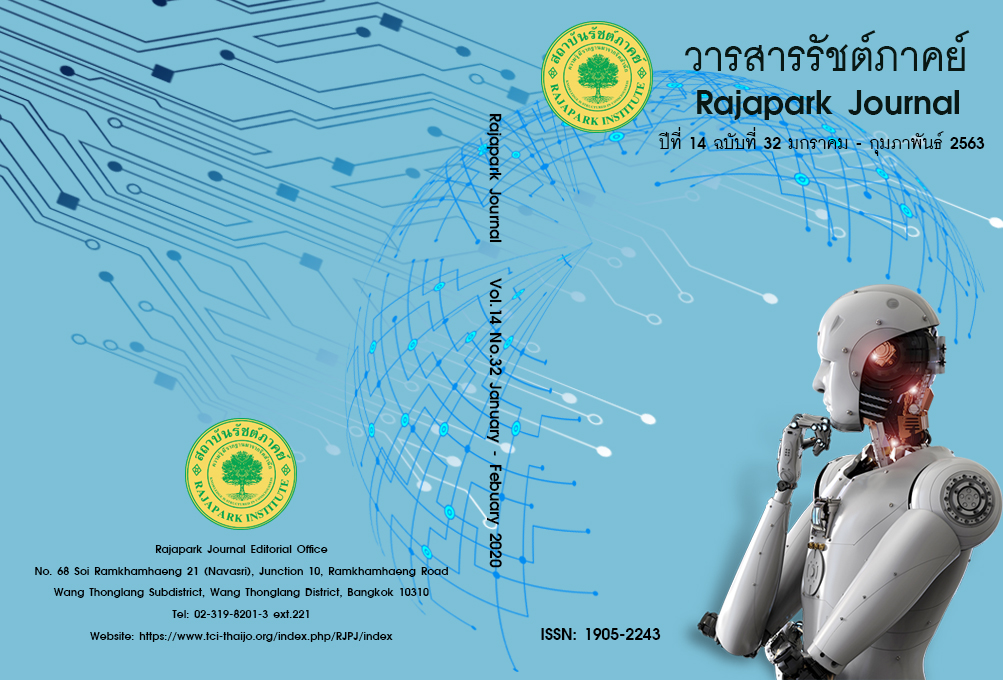Twitter and Democratic Political Attitude of Thai Youth at Siam Square
Main Article Content
Abstract
The research aimed to study the differences of factors: gender, age, educational level, and birthplace, influencing the democratic political attitude of Thai youth from political exposure through twitter. The research is quantitative research under the sampling group are Thai youth whose ages are 18-25 years old by using the days on Saturday and Sunday at Siam Square during 13.00-17.00 pm. The total population size is 400 and the sampling size is 100 as the proportional ratio as 4:1 from 2 groups: by questionnaire of 41 and by online questionnaire of 59 on the sampling size. The research is to study the influence factors on democratic political attitude of Thai youth at Siam Square. The research results were as follows: (1) The relationship between personal factor and democratic political attitude of Thai youth using twitter was on the educational factor and were not on gender, age and birthday. (2) The level of power resulting to democratic political attitude concerning to 4 factors were the pattern of political communication as medium level of power influencing democratic attitude, political exposure perception as medium level of power influencing democratic attitude, political agreement brainstorming as medium level of power influencing democratic attitude, and political participation as high level of power influencing democratic attitude.
Article Details
Views and opinions appearing in the Journal it is the responsibility of the author of the article, and does not constitute the view and responsibility of the editorial team.
References
Buntadthong, K. (2015). Social Network Usage Behavior and Bangkok Older Person’s Satisfation. Individual case study Master's degree, Bangkok University.
Hemmin, A. (2013). Social Media Consumption Behaviors and Opinion towards Results of Experiencing Social Media in Bangkok Metropolitan. Master's Thesis of National Institute of Development Administration.
Kaewsuksai, R. & Jussapalo, C. (2013). Online Social Network: Facebook Usage for the Learner’s Development. Princess of Naradhiwas University Journal, 6(Special), 195-205.
Klapper, J. T. (1960). The Effects of Communication. New York: Free Press.
McQuail, Dennis. (2005). McQuail’s Mass Communication Theory. London: Sage Publication.
Phaikaset, U. (2015). People’s Participation through Social Media Facebook of Thai Government Agencies. Doctor of Philosophy Program, Sripatum University.
Phetcharayut, K. (2009). Media and Political News Perception of People in Chiang Mai Municipality. Master's Thesis, Maejo University.
Prateuang, P. (1992). Behavior Modification: Theory and Application. Bangkok: Odeon store.
Senkaew, K. (2017). Social Network Usage Behaviours of X Generation in Bangkok. M.B.A. Bangkok University.
SongTrai, N. (2004). The Role of the Media to Influence Community Leaders in the Development Initiative under the OTOP: a case study of Hua Wiang Municipality, Sena District, Phra Nakorn Sri Ayutthaya Province. Master's Thesis, Kasetsart University.
Wannarach, P. (2006). A Case Study of the Local Community Leaders’ Attitude in Role of Sub-District Administration Organization to Conserved Natural Resource of Doi Luang National Park. Department of National Parks, Wildlife and Plant Conservation.
Whattananarong, K. (2011). Building Trust and Accepting Online Media. Retrieved December 15, 2018. from


